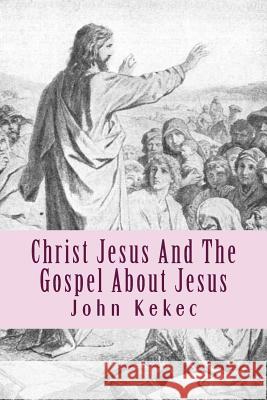Christ Jesus » książka
Christ Jesus
ISBN-13: 9781514223277 / Angielski / Miękka / 2015 / 220 str.
A religious faith is a fundamental human quality, and many Christians try to relate to it better, but it often seems so dated and detached. Dedicated church leaders look for ways to make it more appealing, but generally have been hesitant about presenting Christ Jesus' humanity and Jewish heritage, and how His original teachings were later affected during those turbulent historic times and by the expanding church. It is natural for Christians to question and refine their religious convictions and to pray that their adopted beliefs are acceptable in His sight. It is assumed that most Christians have at least a cursory understanding of the New Testament. The many available historical accounts, by Josephus, Tacitus, and others and the many non-canonized religious accounts written by such notable 'Church Fathers' as Clement, Eusebius and many others, have been rather ignored; regarding them as insignificant, and consequently requiring a greater demand on our faith. Whoever Jesus was, however, and whatever he stood for must be reconciled against the backdrop of the spectacle of His time. The mission of this book is to employ these additional valuable resources to fill this void and provide this compelling new insight to invigorate and reinforce the Christian faith- raising it to a higher level of integrity and confidence while adding vitality and visceral emotions- i.e. breathing new life into it by stepping into the first century environment with Jesus and those that followed after Him.The miracle of Christ Jesus, the messiah, mediator before God, and an instrument of our salvation is upheld and paramount, even though an alternate view of certain aspects of the Christian orthodoxy are felt necessary to more faithfully reflect our faith in the light of the original historic record and the subsequent expanded church dogma. This unique presentation provides a fresh and more eye-opening look at our Christian foundation of faith. Scriptural references, Roman and Jewish historical accounts, and other non-canonized religious scrolls by the Essenes and early 'Church Fathers' are integrally woven in as this first century life of Christ story and the apostles' evangelism are told. This more encompassing perspective also helps to reconcile many of the more striking scriptural enigmas that are commonly encountered. Little has been revealed about Jesus' early life before His three year public ministry - His family, His tumultuous historic environment, and His Jewish upbringing. The paramount question for any Christian in this regard is how these factors, together with God's magnificent intervention in Christ Jesus' life, ultimately influenced His teachings. We will be seeking the answer to this question. Over the recent centuries many Life of Christ stories have been written. Some of these, such as The Greatest Story Ever Told, Quo Vadis, and many others have received the church's sanction, but such many others as The Last Temptation of Christ and The Brook Kerith have been labeled as blasphemous. These are all popular and intriguing stories and illustrate a Christian's desire to know more. Later in the first century, Christ Jesus' followers must have begun to question themselves. This was when the Gospels were being written amidst all the national turmoil, their own fading memories, and the controversies regarding the many diverging and competing Jewish, Christian, and pagan Gentile beliefs. Today, twenty centuries later, Christians are still faced with this same problem, but a better understanding is attainable with the insight these extra-Biblical and historic resources can provide. So this is the life story of Christ Jesus and his Christology (Part I), which is followed by the Gospel about Jesus (Part II), which is the interpretation of His Christology as gathered from the impressions of his first generation followers, with both parts augmented by these contemporary historical accounts and early extra-Biblical religious resourc
Zawartość książki może nie spełniać oczekiwań – reklamacje nie obejmują treści, która mogła nie być redakcyjnie ani merytorycznie opracowana.











